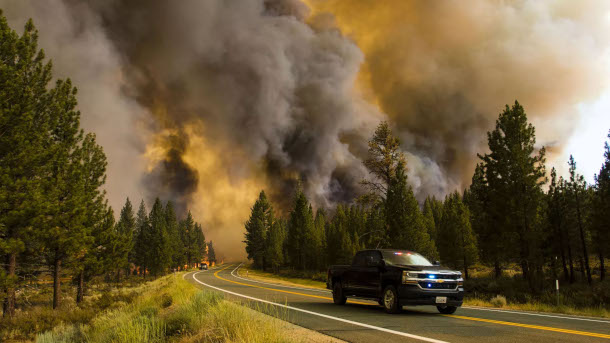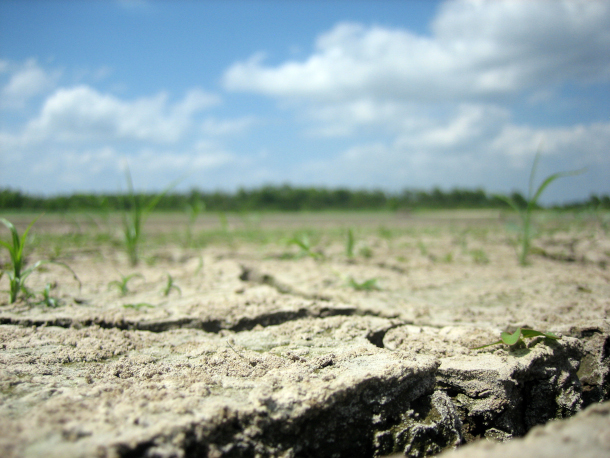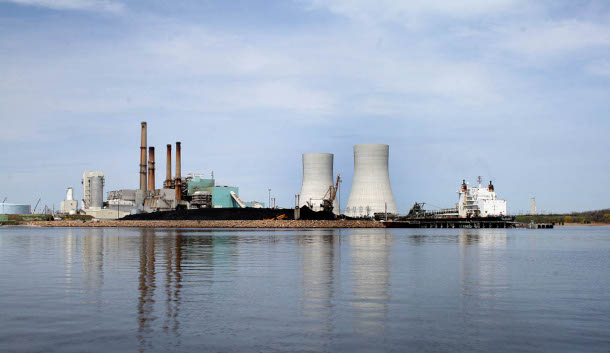Biden Punts on National Climate Emergency
Air Date: Week of July 22, 2022

Over the past two decades, warmer springs and longer dry summers amplified by climate change have resulted in drier soil and vegetation, increasing the length and damage of the wildfire season. To paint a picture, NOAA estimates the total costs of wildfires in 2017 and 2018 to be more than $40 billion. (Photo: Felton Davis, Flickr, CC BY 2.0)
West Virginia Democratic Senator Joe Manchin blocked passage of a half trillion-dollar measure in the Build Back Better Bill to address climate change. So, President Biden responded with more executive actions on climate including boosting offshore wind, but he stopped short of declaring a national climate emergency as some in Congress have urged. Vermont Law School professor and former EPA Regional Counsel, Patrick Parenteau joins host Steve Curwood for more.
Transcript
BASCOMB: From PRX and the Jennifer and Ted Stanley Studios at the University of Massachusetts Boston, this is Living on Earth. I’m Bobby Bascomb.
CURWOOD: And I’m Steve Curwood. Federal election commission data show West Virginia Democratic Senator Joe Manchin has taken more money from oil and gas interests than any other member of the current Congress. Mr. Manchin recently blocked passage of a half-trillion-dollar measure to address climate change. So, President Biden hit back. Although, the president didn’t go as far as calling a national climate emergency, disappointing some in congress who have called for such action. But, speaking in the blazing sun during a heat wave at a green energy factory in Massachusetts on July 20, he didn’t rule it out for the future.
BIDEN: As president, I have a responsibility to act with urgency and resolve when our nation faces clear and present danger. And that’s what climate change is about. It is literally, not figuratively, a clear and present danger. The health of our citizens and our communities is literally at stake. The U.N.’s leading international climate scientist called the latest climate report nothing less than “code red for humanity.”
CURWOOD: Unless democrats can gain more seats in the November elections as to be able to bypass Joe Manchin, President Biden will have to ramp up executive actions such as those he mentioned for more windfarms and resources for heat waves.
BIDEN: In the coming days my administration will announce the executive actions we have developed to come back to some urgency. We need to act. Just take a look around. Right now, 100 million Americans are under heat alert. 100 million Americans. 90 communities across America set records for high temperatures just this year, including here in New England, as we speak.
My message today is loud and clear: Since Congress is not acting on the climate emergency, I will.
— President Biden (@POTUS) July 20, 2022
And in the coming weeks my Administration will begin to announce executive actions to combat this emergency.
CURWOOD: For more, I’m joined now by Vermont Law School Professor Patrick Parenteau, a former regional counsel for the EPA. Pat, welcome back to Living on Earth.
PARENTEAU: Thanks Steve, good to be with you.
CURWOOD: Pat, why do you think that President Biden punted on declaring a national emergency for the climate right now? It's really hot. We're about to go into storm season, he would look good, I would think, to the world and the general public.
PARENTEAU: Yeah, I was surprised, I really did think that we were going to hear an announcement that he was going to declare a national emergency. The heat waves that are baking the country would have would have provided a phenomenal backdrop for that. I have to believe that two things were at work at least: one, I think the lawyers in the administration and in the White House are concerned about how far they can really go using this declaration. There's not a lot of law on this question. And so, I'm sure the lawyers are saying before we start making bold pronouncements, we better think this through. One thing is the legal vulnerability to making this declaration, the other is raising expectations yet again, which Biden has been doing. He did it in the campaign, he did it in the first 100 days, he's been raising expectations about what he was going to be able to do on the climate. And he really hasn't been able to deliver. That's not all his fault. In fact, most of it isn't his fault. Events have foiled him, his own party, Mr. Manchin has foiled him. But the point is, he hasn't delivered. And his approval ratings are in the tank, not just because of climate, of course, it's mostly inflation and other things but climate is a part of it. So, probably some of his political advisors are saying, let's be careful about making bold promises that we really are not sure we can keep. So, there's a debate going on is my guess.
CURWOOD: Well, let's talk about that. I mean, what would the declaration of a national climate emergency mean, a national emergency here? I mean, talk to me about the real limits to the president's power, if he makes that declaration, what could he, what could he not do?

According to NOAA as of July 12, 2022, 44.98% of the U.S. and 50.61% of the lower 48 states are in drought, limiting the water availability for productive farms. (Photo: Dasroofles, Flickr, CC BY-NC-ND 2.0)
PARENTEAU: Yeah, we don't know definitively what the limits of this power are, we do know that there are by some estimates, about 150 different laws that are triggered with this declaration. Of that number, though, probably only a handful, are really the most relevant to the climate crisis or the climate emergency. And of those, some are easier than others to do. And some have unknown legal vulnerabilities. So, the ones that he can do pretty clearly are things like limiting United States government funding of fossil fuel development in other countries. We do a lot of that through the Export Import Bank, the World Bank on which we sit and other international monetary funds. So, one thing he could easily do, well at least legally easily do, would be to say, we're no longer going to underwrite fossil fuel development around the world. Another one, he can direct his military. He has tremendous authority over the military establishment, which is huge, and has a huge carbon footprint. He can turn the military into a model for energy efficiency for electric vehicles, for building retrofits and pour lots of money from the military budget into things that would promote renewable energy.
CURWOOD: You suggested declaring a national emergency, he could really mobilize the military. But even without that, he's commander in chief, how much could he do for the climate using the military?
Senator Joe Manchin of West Virginia, who took more campaign cash from the oil and gas industry than any other senator, blew up the Democratic Party’s plan to fight climate change.
— The New York Times (@nytimes) July 15, 2022
Here’s a look at how the plan unraveled as the Earth continues to warm. https://t.co/js6zCTQvg9 pic.twitter.com/DsXbOzG8XY
PARENTEAU: I think he could do a lot. Probably the biggest thing he could do with a declaration is move a lot of the money around. I mean the Pentagon gets one of the biggest budgets in the United States. And he can ask the military or direct the military to use their procurement authority to prioritize electric vehicles, for example, to retrofit military bases with renewable energy, solar and wind, more efficiency in appliances. But if he wanted to make a really big statement, the declaration would probably help him do that.
CURWOOD: Some people have called for suspending oil exports or stopping oil and gas leasing. To what extent could he do that with a declaration of national emergency?
PARENTEAU: He has quite a bit of authority under the Outer Continental Shelf Lands Act to suspend leasing in places like of course, the Gulf of Mexico where a lot of the leasing occurs, or in the Arctic, where some significant leasing is occurring. And he can do that. There could be and there would be litigation over whether the lesees, the oil companies, are entitled to some form of compensation, if he were to do that, but that's a separate sort of legal question. It isn't going to stop him legally from doing that, so that would probably be one of the major ticket items that he could do having declared a declaration. And then of course, he'd have to see how that action fared when it was challenged in court. Another one that people have pressed him on, a really big one would be to ban oil exports, not gas exports, but oil exports. We are a net exporter of both oil and gas. That's, that's a relatively recent development. And the thing there is that in order for him to ban oil exports, he has to make some key findings. He has to find that the current situation with oil is causing price spikes in the United States, he has to show that if he doesn't ban exports it's going to have a disproportionate impact on the American Labor Workforce. So that one, I would say is in the category of questionable in terms of how the United States Supreme Court would ultimately view the exercise of a ban on oil exports. But that is something he could do.
CURWOOD: And I take it that there's no talk of banning the export of natural gas, because it would betray the Europeans that have been working so hard on this problem between Mr. Putin and the Ukraine.
PARENTEAU: That's right, a ban on export of gas would, would really impact Europe, which is struggling already with its need and its reliance on Russian gas. And of course, that's where Putin is getting the money to fund his war machine. So, the gas issue is much more complicated, I would say, than the oil issue.
CURWOOD: To what extent do you think that limiting oil exports would rattle Wall Street?

On July 20, 2022, President Biden visited the Brayton Point Power plant on Mount Hope Bay in Somerset Massachusetts, pictured above. It was once a coal fired power plant, but it closed down in 2017 and is in the process of becoming integral to the production and distribution of wind energy. (Photo: Shaun C. Williams, Flickr, CC BY 2.0)
PARENTEAU: Oh, I think it would definitely rattle Wall Street and the banks to think that the assets that the companies they're lending money to are now at risk from this presidential declaration. That would be a huge signal to the financial markets that their investments in fossil fuel are at risk.
CURWOOD: So Pat, what would be the actual difference if say President Biden decided to invoke a national emergency for the climate emergency? How close might this get us to slashing 50% of emissions by 2030 like he promised?
PARENTEAU: I don't think it'll get there. It's going to be very important symbolically, to the world, for the president to do this. And it'll give clear direction to his agencies, although he's done that in the past, but even perhaps, up the ante for the agencies to get on with the things that they can do under existing law. But in terms of can it accomplish the pledge that we've made to the Paris Agreement to reduce our emissions by 50% by 2030, he can't get there without Congress. Every analyst that's looked at this, the Rhodium Group that studies this stuff, minutely. Everyone that's looked at this has said a major investment of federal funding is going to be required to jumpstart the renewable energy industry, the electric vehicle industry, the upgrade of the grid that we need, that's just going to require the $500 billion, at least, that the president had in his Build Back Better Bill, and probably a lot more than that. In fact, most of the financial analysts are talking about the U.S. should be expending on the order of a trillion dollars a year if it wants to accomplish net zero emissions of greenhouse gases by 2050. So, we absolutely have to have congressional action here.
CURWOOD: Pat Parenteau is a former Regional Council for the EPA and a Professor at Vermont Law School. Pat, thanks so much for taking the time with us today.
PARENTEAU: Thanks for having me, Steve. Appreciate it.
Links
Learn more about Biden’s executive action Fact Sheet
Reuters | “Biden Stops Short of Declaring Climate Emergency, Takes Steps on Wind Power”
The Washington Post | “Biden to Issue New Climate Policy, Vowing to Act If Congress Doesn’t”
The Guardian | “Biden Under Pressure to Declare Climate Emergency After Manchin Torpedoes Bill”
Living on Earth wants to hear from you!
Living on Earth
62 Calef Highway, Suite 212
Lee, NH 03861
Telephone: 617-287-4121
E-mail: comments@loe.org
Newsletter [Click here]
Donate to Living on Earth!
Living on Earth is an independent media program and relies entirely on contributions from listeners and institutions supporting public service. Please donate now to preserve an independent environmental voice.
NewsletterLiving on Earth offers a weekly delivery of the show's rundown to your mailbox. Sign up for our newsletter today!
 Sailors For The Sea: Be the change you want to sea.
Sailors For The Sea: Be the change you want to sea.
 The Grantham Foundation for the Protection of the Environment: Committed to protecting and improving the health of the global environment.
The Grantham Foundation for the Protection of the Environment: Committed to protecting and improving the health of the global environment.
 Contribute to Living on Earth and receive, as our gift to you, an archival print of one of Mark Seth Lender's extraordinary wildlife photographs. Follow the link to see Mark's current collection of photographs.
Contribute to Living on Earth and receive, as our gift to you, an archival print of one of Mark Seth Lender's extraordinary wildlife photographs. Follow the link to see Mark's current collection of photographs.
 Buy a signed copy of Mark Seth Lender's book Smeagull the Seagull & support Living on Earth
Buy a signed copy of Mark Seth Lender's book Smeagull the Seagull & support Living on Earth

